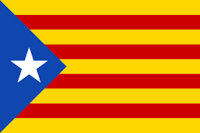Catalonia - Economy
 Catalonia, with a GDP (2016): 223.6 billion Euros, had always looked beyond its own borders, thus building a creative society, a dynamic, entrepreneurial attitude and where innovation is a motor for progress. Catalan industry accounts for 24% of Spanish industry and it ss highly diversified with the main branches being food, chemicals and pharma, motor vehicles, and metal products and machinery.
Catalonia, with a GDP (2016): 223.6 billion Euros, had always looked beyond its own borders, thus building a creative society, a dynamic, entrepreneurial attitude and where innovation is a motor for progress. Catalan industry accounts for 24% of Spanish industry and it ss highly diversified with the main branches being food, chemicals and pharma, motor vehicles, and metal products and machinery.
Catalonia had a prosperous economy. Its primary sector is somewhat insignificant, although it had very strong subsectors that compete throughout the world, such as cava, wine, livestock, meat products and sweet fruits. The Catalan economy also boasts a significant level of industrial activity in sectors such as automobiles and accessories, chemicals, food and the manufacture of electrical household appliances and state-of-the-art computer and office IT equipment. The publishing industry and construction are also of crucial importance. Tourism and its associated business areas are a particularly notable element of the tertiary sector.
The traditional industrial production together with emerging sectors such biotech and renewable energy, services sectors like trading, ICTs, finance, healthcare, media and logistics together now represent two thirds of the Catalan GDP. Considering the widened perimeter of the so-called new industry (which includes internal services aimed at intermediate industrial consumption and the final demand of trade and freight transport sectors), this sector represents 50% of the Catalan GVA (Input-Output Tables 2011). In other words, half of the Catalan economy would have either a direct or indirect relationship with the industrial sector.
The industrial activity, which represents nearly 20 % of the Catalan GDP, had grown particularly in the Barcelona area, and it had also developed in many industrial cities all over the country. Half of the Catalan economy had either a direct or indirect relationship with the industrial sector, innovative, dynamic and diversified.
Today, a strong industrial base and powerful ICT sector are key elements making Catalonia a driving force in industry 4.0. Several companies have already joined this fourth industrial revolution. Catalonia had shown its commitment to 3D printing, it is leading the field in connected vehicle testing, in robotics applied to intelligent logistics management systems or in excellence in big data. And many companies are firmly committed to Barcelona, the Mobile World Capital to do business and develop technology here.
Together with industry, trade and tourism are important activities. Tourism had become one of the most notable economic activities. With more than 18 million foreign tourists in 2016 -4% over 2015-, Catalonia is one of the top European destinations showing 22.2% of the Spanish total tourist accommodation places and 2.5% of the EU. Barcelona holds sixth place among European cities for the number of overnight stays.
The Port of Barcelona is a leading European port in terms of vehicle traffic and specialises in handling high added value goods. More than 100 regular shipping lines connect Barcelona with 200 ports around the world. With some of the world�s most modern and automated container terminals, the Port of Barcelona holds the largest offer of logistics and transport services in Spain and Southern Europe and moves 46m metric tons a year.
Barcelona's airport ranks 7th in Europe. It handled 44 million passengers in 2016 (+11.2% annual growth), 29.1 international. With 100 airlines and flights to 200 destinations around the world, itt was ranked Best Southern Europe Airportin 2016. In 2016, it handled 132,754 tonnes of cargo (+13.3% annual growth).
|
NEWSLETTER
|
| Join the GlobalSecurity.org mailing list |
|
|
|

